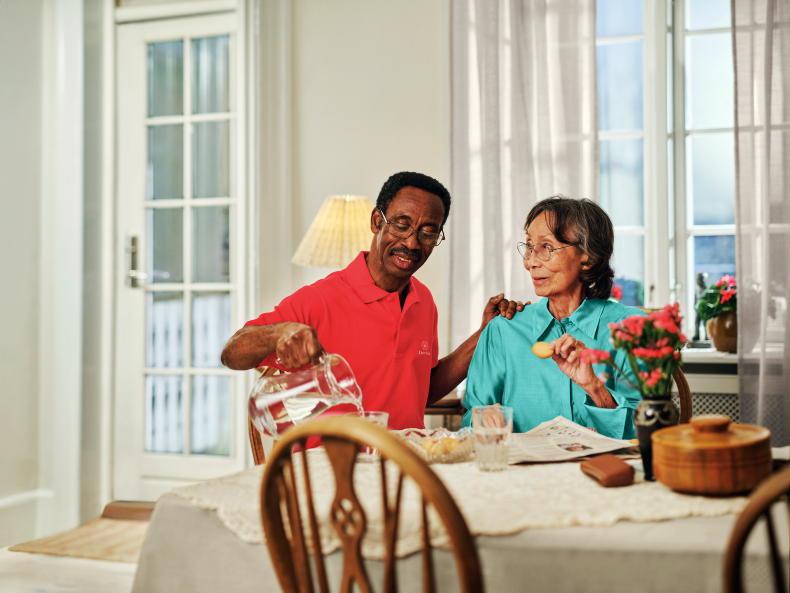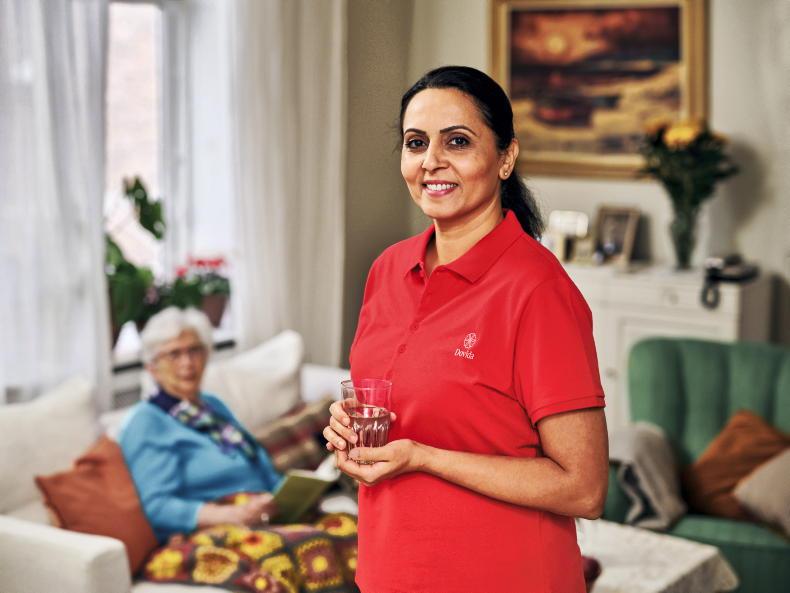Farming families with significant asset holdings are understandably nervous about how their assets will be assessed and fear paying way above the average in nursing home costs.
Fifteen percent of long-term nursing home residents pay 100% of the weekly costs themselves – in Ireland, the average weekly nursing home cost is €1,285. This is often because their wealth exceeds the threshold to qualify for any state support.
Farming families may be unable to offset their farm assets from fair deal means testing after three years, due to leasing arrangements or restrictions around appointing a successor. They face larger nursing home bills as a result.
The good news is with significant investment by successive governments over the past decade, far more free HSE-funded home support is now available – and such support is not means tested.
The increased government investment has come on the back of clear voter preferences: research shows that more than 90% of Irish adults state that their preferred place of care is their own home rather than a nursing home, hospice or hospital.
Companies such as Dovida provide both free HSE home support and private home care services, including meal preparation, light housekeeping and transportation.
Tax relief on home care
Dovida provides private home care services from €33.90/hour. Tax relief is available at the marginal rate (20% or 40%) against such costs, up to a maximum of €75,000 per annum.
It can be cost-effective to complement free HSE home support with paid private care and receive the same or a greater amount of one-to-one care as any nursing home can offer.

Companionship and care.
A critical decision
It is often assumed nursing homes provide round-the-clock care and, in addition to care, the nursing home also provides meals and heated rooms and activities.
If you live at home, you have to pay – or ask family to help you with – your oil bills, your electricity bills and all your food costs, in addition to any private care.
While running your own household carries the same expenses it has done all your life, a better understanding of how care and support work in both nursing homes and home care may help people with their decision-making.
The BDO 2023-2024 survey of private and voluntary nursing homes in Ireland reported that nursing homes provide an average of 3.6 hours of one-to-one support, delivered either by a nurse or a health care assistant, to residents every day.
That’s 25.2 hours per week, which means you have staff supporting you one-to-one for only 15% of your time in a nursing home. This is very different from one person providing you 24/7 care.
On average, Dovida provides its clients with 12 hours a week of HSE-funded home support. However, the HSE often funds up to 21 hours a week and Dovida provides a number of clients in excess of 25 hours a week of HSE-funded care.

Dementia care at home.
Safety considerations
The decision over nursing home or home care is often made not only on cost grounds, but also over safety considerations.
After all, nursing home residents have alarms in their rooms. If they fall at night and can reach the alarm, help will arrive. At home, people live with personal alarms, but help is not always on-site.
However, in both cases, if the alarm cannot be reached or activated, no help will arrive until the morning, when care staff arrive at your home or to your nursing home room.
And people do fall in nursing homes. The Health Information and Quality Authority's (HIQA) notification database states that of the 4,026 serious injuries to nursing home residents that required immediate medical and/or hospital treatment in 2023, 85% of them were from falls and the resident was alone during 70% of such incidents. Over half occurred in the resident’s bedroom.
During the COVID-19 pandemic, nursing homes also experienced greater transmission between residents – home was proven to be a far safer place to avoid infectious diseases.
Nursing homes are clinical environments, with staff in uniforms, alarms sounding and most residents living with multiple complex needs and, as such, are not always appropriate places for people needing care and support.
Happier at home
With tax relief on private home care in addition to HSE home support, care costs at home can be as affordable as nursing homes and risks are manageable.
Every farming family considering the Fair Deal Scheme should also budget for a combination of HSE-funded and private home support. People want autonomy and dignity – and home is where this resides, in spades.
Michael Wright is director of growth at Dovida Ireland. Dovida has 25 local offices located around Ireland, which provide a wide range of private and HSE-funded home care services. Contact 1800-911020 or visit dovida.ie for more.
Farming families with significant asset holdings are understandably nervous about how their assets will be assessed and fear paying way above the average in nursing home costs.
Fifteen percent of long-term nursing home residents pay 100% of the weekly costs themselves – in Ireland, the average weekly nursing home cost is €1,285. This is often because their wealth exceeds the threshold to qualify for any state support.
Farming families may be unable to offset their farm assets from fair deal means testing after three years, due to leasing arrangements or restrictions around appointing a successor. They face larger nursing home bills as a result.
The good news is with significant investment by successive governments over the past decade, far more free HSE-funded home support is now available – and such support is not means tested.
The increased government investment has come on the back of clear voter preferences: research shows that more than 90% of Irish adults state that their preferred place of care is their own home rather than a nursing home, hospice or hospital.
Companies such as Dovida provide both free HSE home support and private home care services, including meal preparation, light housekeeping and transportation.
Tax relief on home care
Dovida provides private home care services from €33.90/hour. Tax relief is available at the marginal rate (20% or 40%) against such costs, up to a maximum of €75,000 per annum.
It can be cost-effective to complement free HSE home support with paid private care and receive the same or a greater amount of one-to-one care as any nursing home can offer.

Companionship and care.
A critical decision
It is often assumed nursing homes provide round-the-clock care and, in addition to care, the nursing home also provides meals and heated rooms and activities.
If you live at home, you have to pay – or ask family to help you with – your oil bills, your electricity bills and all your food costs, in addition to any private care.
While running your own household carries the same expenses it has done all your life, a better understanding of how care and support work in both nursing homes and home care may help people with their decision-making.
The BDO 2023-2024 survey of private and voluntary nursing homes in Ireland reported that nursing homes provide an average of 3.6 hours of one-to-one support, delivered either by a nurse or a health care assistant, to residents every day.
That’s 25.2 hours per week, which means you have staff supporting you one-to-one for only 15% of your time in a nursing home. This is very different from one person providing you 24/7 care.
On average, Dovida provides its clients with 12 hours a week of HSE-funded home support. However, the HSE often funds up to 21 hours a week and Dovida provides a number of clients in excess of 25 hours a week of HSE-funded care.

Dementia care at home.
Safety considerations
The decision over nursing home or home care is often made not only on cost grounds, but also over safety considerations.
After all, nursing home residents have alarms in their rooms. If they fall at night and can reach the alarm, help will arrive. At home, people live with personal alarms, but help is not always on-site.
However, in both cases, if the alarm cannot be reached or activated, no help will arrive until the morning, when care staff arrive at your home or to your nursing home room.
And people do fall in nursing homes. The Health Information and Quality Authority's (HIQA) notification database states that of the 4,026 serious injuries to nursing home residents that required immediate medical and/or hospital treatment in 2023, 85% of them were from falls and the resident was alone during 70% of such incidents. Over half occurred in the resident’s bedroom.
During the COVID-19 pandemic, nursing homes also experienced greater transmission between residents – home was proven to be a far safer place to avoid infectious diseases.
Nursing homes are clinical environments, with staff in uniforms, alarms sounding and most residents living with multiple complex needs and, as such, are not always appropriate places for people needing care and support.
Happier at home
With tax relief on private home care in addition to HSE home support, care costs at home can be as affordable as nursing homes and risks are manageable.
Every farming family considering the Fair Deal Scheme should also budget for a combination of HSE-funded and private home support. People want autonomy and dignity – and home is where this resides, in spades.
Michael Wright is director of growth at Dovida Ireland. Dovida has 25 local offices located around Ireland, which provide a wide range of private and HSE-funded home care services. Contact 1800-911020 or visit dovida.ie for more.











SHARING OPTIONS